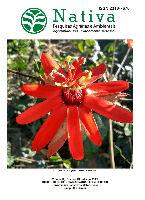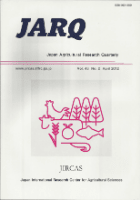
Revista Bio Ciencias
Scope & Guideline
Fostering collaboration in the biological sciences.
Introduction
Aims and Scopes
- Ecological and Environmental Studies:
Research addressing ecological dynamics, biodiversity, and environmental impacts, particularly in the context of Mexican ecosystems. - Agricultural Sciences and Crop Management:
Studies focusing on agricultural practices, crop yield optimization, pest management, and sustainable farming techniques. - Health and Nutrition:
Investigations into health-related topics, including the effects of nutrition on health, public health issues, and the impact of environmental factors on human health. - Aquaculture and Marine Biology:
Research pertaining to aquatic species, their management, and the sustainability of aquaculture practices. - Phytochemistry and Natural Products:
Exploration of plant-derived compounds, their properties, and potential applications in medicine and agriculture. - Genetics and Biotechnology:
Studies involving genetic analysis, biotechnological applications, and innovations in enhancing species performance.
Trending and Emerging
- Antimicrobial Resistance and Pathogen Management:
A growing focus on studies addressing antimicrobial resistance, especially in agricultural and aquaculture settings, indicates an increasing concern over public health and food safety. - Sustainable Agriculture and Environmental Impact:
Research aimed at sustainable agricultural practices and their environmental impacts is gaining traction, reflecting an urgent need to address climate change and biodiversity loss. - Functional Foods and Nutraceuticals:
There is an increasing interest in the health benefits of functional foods and natural products, with studies exploring their potential in preventing diseases and promoting health. - Climate Change Effects on Biodiversity:
Emerging studies focus on understanding how climate change impacts local biodiversity and ecosystems, emphasizing the importance of adaptive strategies in conservation. - Biotechnology in Aquaculture:
Innovative research applying biotechnology to improve aquaculture practices and sustainability is on the rise, addressing food security and environmental issues.
Declining or Waning
- Traditional Medicinal Practices:
Research centered on indigenous or traditional medicinal practices has become less prominent, possibly due to a shift towards more empirical and experimental approaches in health sciences. - Historical and Cultural Studies in Biology:
Papers focusing on historical analyses or cultural implications within biological contexts are less frequently published, suggesting a declining interest in these interdisciplinary approaches. - Purely Theoretical Studies:
There has been a noticeable decline in studies that are purely theoretical without practical applications, as the journal increasingly favors research with direct implications for practice and policy.
Similar Journals

Bioscience Journal
Transforming ideas into impactful bioscience research.Bioscience Journal is a premier open-access publication dedicated to advancing research in the field of agricultural and biological sciences. Published by the Universidade Federal de Uberlândia, this journal has been a vital resource for the academic community since its transition to open access in 2001. With the ISSN 1981-3163, it serves as an essential platform for disseminating innovative research findings and methodologies that contribute to the sustainable development of biological resources. As of 2023, it has been categorized in the Q4 quartile in Agricultural and Biological Sciences (miscellaneous) and ranks 152 out of 221 in Scopus, placing it in the 31st percentile. The journal's scope encompasses a wide array of topics that stimulate interdisciplinary discourse and collaboration among researchers, professionals, and students alike. With engaging content and a commitment to accessibility, Bioscience Journal plays a crucial role in fostering scholarly communication and enriching the academic landscape in Brazil and beyond.

Nativa
Empowering global research for a greener future.Nativa, published by the Universidade Federal de Mato Grosso in Brazil, stands as a prominent open-access journal since 2013, dedicated to the dissemination of research across various domains of Agricultural and Biological Sciences. With its ISSN 2318-7670, Nativa aims to foster scholarly communication and collaboration among researchers and practitioners worldwide. The journal occupies notable positions within the Scopus rankings, with a Q3 classification in several categories, including Agricultural and Biological Sciences (miscellaneous) and Environmental Science (miscellaneous), while also holding a Q4 classification in areas such as Agronomy and Crop Science and Animal Science and Zoology. This positioning reflects its commitment to advancing knowledge and understanding crucial to sustaining and enhancing our natural resources. Nativa seeks to engage a diverse readership by providing a platform for innovative research, fostering interdisciplinary discourse, and addressing pressing environmental challenges and conservation efforts essential for sustainable development.

Plants-Basel
Exploring the intricate web of plant interactions.Plants-Basel is a distinguished open access journal published by MDPI since 2012, offering a comprehensive platform for researchers and professionals in the field of ecology, plant science, and evolutionary biology. Based in Switzerland, this journal has established itself as a leader in disseminating high-quality research, evident through its impressive rankings in multiple categories, including Q1 in Ecology and Plant Science for 2023. With a substantial impact factor and a dedicated focus on advancing our understanding of plant interactions, ecosystems, and sustainable practices, Plants-Basel is vital for scholars seeking to contribute to these critical fields. The journal's commitment to open access enhances visibility and accessibility, facilitating the widespread sharing of knowledge essential for addressing contemporary ecological challenges.

All Life
Championing Collaboration in Biological ResearchAll Life is a distinguished academic journal published by TAYLOR & FRANCIS LTD, based in the United Kingdom, focusing on the interdisciplinary realms of agricultural and biological sciences, biochemistry, genetics, and neuroscience. With the ISSN 2689-5293 and E-ISSN 2689-5307, this open-access journal aims to disseminate high-quality research from 2020 to 2024, facilitating a wider reach and impact across various fields. Notably, it holds a Q3 ranking in both Agricultural and Biological Sciences, as well as Biochemistry, Genetics and Molecular Biology, and a Q4 ranking in Neuroscience, reflecting its growing presence in these disciplines. All Life aims to foster collaboration among researchers, professionals, and students, encouraging innovative approaches in understanding life sciences. By delivering timely insights and thought-provoking discussions, the journal plays a crucial role in advancing knowledge and promoting interdisciplinary dialogue in the evolving landscape of life sciences research.

Vestnik Tomskogo Gosudarstvennogo Universiteta-Biologiya
Elevating Academic Impact in the Biological SciencesVestnik Tomskogo Gosudarstvennogo Universiteta-Biologiya is a prominent peer-reviewed journal dedicated to advancing knowledge in the fields of Agricultural and Biological Sciences, Biochemistry, and Environmental Science, published by TOMSKIJ GOSUDARSTVENNYI UNIV in the Russian Federation. With an ISSN of 1998-8591 and an E-ISSN of 2311-2077, this journal serves as a vital platform for researchers to disseminate findings that encompass diverse biological disciplines. Although currently categorized in the fourth quartile across several fields, including Agricultural and Biological Sciences (Q4) and Environmental Science (Q4), the journal is committed to improving its academic impact and visibility. Its publication spectrum includes significant contributions from both local and international scholars, fostering a rich exchange of ideas and research methodologies. Access to the journal’s content is unrestricted, providing valuable resources for students, professionals, and researchers alike. As the journal converges its focus from 2018 to 2024, it aims to enhance its academic stature while contributing rigorously to contemporary biological research.

JARQ-JAPAN AGRICULTURAL RESEARCH QUARTERLY
Transforming Agricultural Strategies Through KnowledgeJARQ - Japan Agricultural Research Quarterly serves as a pivotal platform in the field of agricultural sciences, published by the esteemed Japan International Research Center for Agricultural Sciences. Established in 1973, this journal has a rich history and plays a critical role in disseminating significant research findings relevant to agronomy, crop science, animal science, ecology, and biotechnology. Despite its ranking in the lower quartiles, with impressive coverage from 1973 to 2024, it continues to attract contributions that enhance agricultural strategies and practices in Japan and beyond. The journal facilitates discussions that are essential for fostering innovation in agricultural methodologies and environmental sustainability. Accessible to a diverse audience, including researchers, academics, and practitioners, JARQ emphasizes the importance of advancing agricultural research and its implications for food security and ecological balance.

BIOLOGICAL RESEARCH
Transforming research into accessible knowledge.BIOLOGICAL RESEARCH is a prestigious, peer-reviewed journal published by the Société de Biologie de Chile, dedicated to advancing the fields of Agricultural and Biological Sciences, Biochemistry, Genetics, and Molecular Biology, and Medicine. With an impressive ranking in the top quartile (Q1) in these categories as of 2023, this journal maintains high academic standards and visibility, making it a vital resource for researchers and professionals alike. Operating under an Open Access model since 2013, it ensures that research findings are freely accessible to a global audience, promoting the dissemination of knowledge and collaboration across disciplines. With a publication history dating back to 1992 and continued updates until 2024, BIOLOGICAL RESEARCH serves as a crucial platform for innovative research that impacts both scientific and healthcare communities. The journal’s commitment to quality and relevance is evidenced by its competitive performance in Scopus rankings, further solidifying its role as a leading journal within the biological sciences.

Chilean Journal of Agricultural & Animal Sciences
Empowering the future of agricultural sciences.Chilean Journal of Agricultural & Animal Sciences, published by UNIV CONCEPCION, CAMPUS CHILLAN, serves as a pivotal platform for disseminating innovative research in the agricultural and biological sciences. With an ISSN of 0719-3882 and an E-ISSN of 0719-3890, this journal has established its significance in the academic community, particularly within the realm of agricultural studies in Chile and beyond. As it continues to evolve from 2014 through 2024, the journal is classified in the Q4 quartile for Agricultural and Biological Sciences and ranks 187th out of 221 journals in this category according to Scopus, placing it in the 15th percentile. While currently not an open-access journal, it aims to provide readers with insightful studies and developments that contribute to the understanding of agricultural practices and animal sciences. Researchers, professionals, and students will find invaluable resources here, fostering knowledge transfer and collaboration within this critical field.

Temas Agrarios
Fostering Global Dialogue on Agricultural PracticesTemas Agrarios is a premier scholarly journal focused on the dynamic field of agricultural sciences, published by the University of Córdoba, Faculty of Agricultural Sciences. Since its establishment, this journal has committed to advancing knowledge and fostering research in agricultural practices and policies, contributing significantly to the discourse surrounding food security, sustainable farming, and rural development. With an open access model implemented in 2003, Temas Agrarios ensures that critical information and research findings are readily available to the global academic community, promoting wider dissemination and accessibility. Researchers, professionals, and students can benefit from its insightful articles, which address pressing agricultural issues in Colombia and beyond, enhancing both local and international scientific dialogue. Although specific impact metrics such as H-index and Scopus rankings are not disclosed, the journal's longstanding presence underscores its importance as a platform for high-quality agricultural research.

JOURNAL OF ENVIRONMENTAL BIOLOGY
Bridging Research and Environmental SolutionsJOURNAL OF ENVIRONMENTAL BIOLOGY, a prominent publication in the field of environmental science, is published by Triveni Enterprises in India. Since its inception in 1988, this journal has served as a vital platform for disseminating research related to environmental biology, encompassing areas such as environmental engineering, health impacts of toxic substances, and the mechanisms of mutagenesis. With an increasing impact in the scientific community, the journal is categorized in the third quartile (Q3) in Environmental Engineering and fourth quartiles (Q4) in Health, Toxicology, and Mutagenesis according to 2023 rankings. Researchers, professionals, and students will find value in its robust collection of original research articles, review papers, and case studies that address pressing environmental issues and promote sustainable practices. Although it is not an open-access journal, the comprehensive scope of the content published from 1988 to 2024 ensures that critical insights remain accessible to those dedicated to advancing the knowledge in environmental sciences.